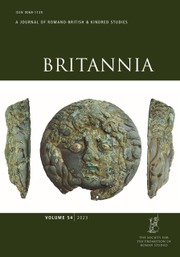Article contents
Roman Wales: Aerial Discoveries and New Observations from the Drought of 2018
Published online by Cambridge University Press: 26 May 2020
Abstract
This paper provides description and context for some of the discoveries made by the Royal Commission on the Ancient and Historical Monuments of Wales during aerial reconnaissance in the drought conditions of the summer of 2018. New discoveries include two marching camps, three auxiliary forts and a remarkable series of stone buildings outside the fort at Pen y Gaer. The photographs also clarify the plan of several known villas as well as identifying some potential villa sites and enclosure systems of probable Romano-British date in south-eastern, south-western and north-western Wales. The recognition of a new road alignment south of Carmarthen is suggestive of another coastal fort at or near Kidwelly.
Keywords
- Type
- Articles
- Information
- Copyright
- Copyright © Crown Copyright and The Authors, 2020. Published by Cambridge University Press on behalf of The Society for the Promotion of Roman Studies
Footnotes
All figures (except fig. 11) are Crown copyright and are reproduced with the permission of the Royal Commission on the Ancient and Historical Monuments of Wales (RCAHMW), under delegated authority from The Keeper of Public Records. The maps are based upon Ordnance Survey material with the permission of Ordnance Survey on behalf of the Controller of Her Majesty's Stationery Office, © Crown copyright. Unauthorised reproduction infringes Crown copyright and may lead to prosecution or civil proceedings. Licence number: 100022206.
References
BIBLIOGRAPHY
- 5
- Cited by


